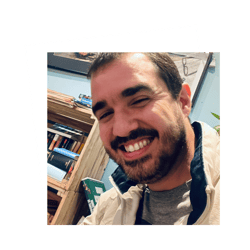DATA
SCIENCE WEEK 2024
September 10th, 11th and 12th
Insper - Room 513, 5th floor
200 Quatá Street
Hybrid Event

ABOUT THE EVENT
Data Science Week is a unique opportunity for professionals and students to learn more about current and relevant topics, participate in interesting debates, and network with experts in the area. The event will bring together leading figures in data science and artificial intelligence from Brazil and Europe, providing an excellent chance to learn from well-known experts and expand your network of contacts.The topics discussed include artificial intelligence, health, and sensitive data governance.
HOW TO PARTICIPATE
1
Access the forms that
correspond to the days you
are interested in.
2
Fill in all the forms for each day you plan to participate.
3
Before the event, confirm your participation by answering the e-mail you will receive.
| TUESDAY, SEPTEMBER 10th | |
We will talk to experts about the opportunities and possibilities for exploring applications of Artificial Intelligence (AI) in health data, covering everything from data collection and analysis to ethical and regulatory implications. |
|
| 6:30 pm - 7 pm | Reception, Networking, Coffee |
| 7 pm - 8 pm |
AI in healthcare data Artificial Intelligence applied to healthcare data ■ Paulo Amaral (Insper)■ Helder Nakaya (Hospital Israelita Albert Einstein) ■ Jonathan Austrian (NYU Langone Health) Pitch 20 minutes/each Simultaneous translation |
| 8 pm - 8:15 pm | Break |
| 8:15 pm - 9:30 pm |
Discussion ■ Paulo Amaral (Insper)■ Helder Nakaya (Hospital Israelita Albert Einstein) ■ Lislaine Aparecida Fracolli (USP) ■ Jonathan Austrian (NYU Langone Health) ■ Mediating: Clara Velasco |
| Subscribe | |
| WEDNESDAY, SEPTEMBER 11th | |
We will discuss the importance of sensitive data governance, present the SATRE tool for standard architectures for safe and secure research environments for access to protected data, and the case of the creation of the Insper Data Science Center's safe rooms, focusing on practices and policies for protecting and accessing sensitive data for research. |
|
| 6:30 pm - 7 pm | Reception, Networking, Coffee |
| 7 pm - 8 pm |
Sensitive Data Governance Safe pods: Governing Sensitive Data for Research ■ Katie Wilde : SATRE Assessment■ André Filipe : Data Center and AI Pitch 20 minutes/each Simultaneous translation |
| 8 pm - 8:15 pm | Break |
| 8:15 pm - 9:30 pm |
Discussion ■ Katie Wilde (Aberdeen University)■ André Filipe (Insper) ■ Hellen Geremias dos Santos (FioCruz) ■ Mediating: Clara Velasco |
| Subscribe | |
| THURSDAY, SEPTEMBER 12th | |
This panel will debate data governance practices in healthcare, highlighting the experiences of NHS Grampian and DaSH in the UK and Datasus in Brazil, with the intention of sharing knowledge and promoting best practices. |
|
| 6:30 pm - 7 pm | Reception, Networking, Coffee |
| 7 pm - 8 pm |
Data Governance ■ Tiago Bahia Fontana : Ministry of Health of Brazil - DATASUS Pitch 20 minutes/each Simultaneous translation |
| 8 pm - 8:15 pm | Break |
| 8:15 pm - 9:30 pm |
Discussion ■ Katie Wilde (Aberdeen University)■Tiago Bahia Fontana (Ministry of Health of Brazil - DATASUS) ■ Luana Araujo (CAdHSI) ■ Mediating: Clara Velasco |
| Subscribe | |

Paulo de Paiva Amaral
Assistant professor of Bioengineering at Insper. He holds a bachelor's degree in Biological Sciences (University of Brasília) and has training in Biochemistry (Master's degree at the Institute of Chemistry, USP) and Molecular Genetics (Ph.D. at the Institute for Molecular Bioscience, University of Queensland). His research has explored the roles of non-coding DNA and RNA, epigenetics, and the 3D architecture of the genome in a variety of biological systems, particularly cancer cells and stem cells, in both academic and industrial settings. He was a research scientist at Storm Therapeutics and co-founder of Pentail Enzymes Limited, a startup that combines bioinformatics to analyze personal genomics data as well as genome editing to create in silico and in vitro preclinical toxicity testing assays. He has also taught at various institutions as a visiting professor, including Karolinska Institutet and Uppsala University in Sweden, and Humanitas University and Università Campus Bio-Medico di Roma in Italy. His current research focuses on the use of multiplexed direct RNA sequencing for diagnosis and functional assays exploring the roles of RNAs and their chemical modifications in viral infections and immunity.

Helder Nakaya
Senior researcher at Albert Einstein Hospital, a part-time professor at USP, and co-founder of D2DNA and Synamics Therapeutics. He is also an adjunct professor at Emory University and a former vice-director of FCF-USP. He serves on the boards of the Brazilian Society of Immunology and the Brazilian Association of Bioinformatics. He was affiliated with the Brazilian Academy of Sciences and consulted for CEPI and IUIS. He was also on the advisory board of the European Ebola vaccine consortium and IIASA. The Computational Systems Biology lab website is www.csbiology.org.

Jonathan Austrian
Dr. Austrian is an Associate Professor of medicine and the associate chief medical informatics officer at NYU Langone Health based in New York City. He also serves as the lead in the Medical Center IT Department of Health Informatics, Section of Clinical Informatics. He completed his undergraduate studies at the University of Pennsylvania, medical school at Weill Cornell Medical College, and residency at Montefiore Medical Center. He has been in the field of health informatics for 18 years helping lead transformative health information technology initiatives including the Epic electronic health record implementation. He partners on critical initiatives including the application of AI in health care, clinical decision support, and voice technologies. He has helped define and lead the section of clinical informatics, where he supervises physician informaticists in their health IT projects. Clinically, he practices as a hospitalist providing care for patients on the general medicine service. In addition to his operational and clinical responsibilities, he lectures and publishes on clinical decision support and AI. When not at work, he enjoys playing tennis and biking with his kids and wife.

Lislaine Aparecida Fracolli
She is currently a full professor at the University of São Paulo, working in the Department of Nursing in Public Health at the School of Nursing. She has theoretical and practical experience in Nursing in Primary Care and has been focusing her research on the study of Nursing practice in Public Health, addressing the following topics: public health, nursing work, human resources training, services, health promotion, and child development. She teaches undergraduate and graduate courses at the EEUSP. She has experience in extension projects, through partnerships established with municipal and state health departments, aimed at improving primary health care for populations. She was the coordinator of the Nursing Residency Program in Primary Care. She is a member of the Center for Science for Early Childhood (NCPI), a scientific center linked to the FMCSV and Harvard University. She also participates in the INPD Developmental Psychiatry for Childhood and Adolescence, associated with IPq/USP.

Katie Wilde
She is the Head of Digital Research at the University of Aberdeen, part of Digital and Information Services with a remit of supporting Researchers with their digital needs, and joined as HDRUK Co-Director for Scotland in April 2023. Katie led on setting up of the Grampian Safe Haven (DaSH) within Aberdeen, one of five Trusted Research Environments in Scotland, and securing ISO27001 certification for this service. Katie is DaSH Director and holds an Honorary Contract with NHS Grampian working closely with colleagues across the region to deliver over 500 projects across a wide range of health informatics. Katie has a Master in Mathematics and joined the University of Aberdeen as a Graduate Trainee, working her way up to now lead three distinct teams that help support researchers with their digital needs form Data Management Plans to High-performance computing.

André Filipe de Moraes Batista
He is a Ph.D. in Computer Engineering from the University of São Paulo (USP). André is a professor and chief technology officer at Insper. He holds a bachelor's and a master's degree in computer science, emphasizing artificial intelligence, has over ten years of experience in information technology and high-performance computing, and works as a data scientist in the healthcare sector. He completed postdoctoral research in data science applied to health at the School of Public Health of the University of São Paulo, with international partnerships, notably with Harvard University.

Hellen Geremias dos Santos
Hellen holds a PhD in Epidemiology from the School of Public Health at the University of São Paulo (2018) and a Master's degree in Public Health from the State University of Londrina (2012). She has a Bachelor's degree in Statistics from the State University of Maringá (2015) and in Nursing from the State University of Londrina (2009). She is a public health researcher at the Carlos Chagas Institute of the Oswaldo Cruz Foundation, specializing in applied statistics for biological and health data. She works with predictive models for diagnosis and prognosis in public health and medicine, as well as statistical methods for genomic data analysis.

Tiago Bahia Fontana
Tiago is the General Coordinator of Dissemination and Integration of Health Data and Information. He holds a degree in Psychology and a Specialization in Collective Mental Health from Faculdade Ruy Barbosa (FRB); a Master’s degree in Community Health from the Graduate Program of the Institute of Collective Health at the Federal University of Bahia (PPG-ISC/UFBA - Health Planning and Management). He has experience in the fields of Public Health and Collective Health, with an emphasis on: the Unified Health System (SUS); Health Planning and Management (Strategic Management; Project Management; Process Management); Primary Health Care; Continuing Education and Permanent Education in Health; Telemedicine/Telehealth; Tele-Education; Virtual Interaction and Knowledge Platforms (Virtual Learning Environment and Evidence-Based Health Platform); Health Surveillance; Health Information Systems; Dissemination of Strategic Health Information; Technological Innovation in Health.

Luana Araujo
She is an infectious disease physician trained at UFRJ and a master's degree in public health from Johns Hopkins University. During the pandemic, she had an international role and emerged as a leading figure in scientific communication in the country, receiving awards for her technical leadership and speaking to more than 450,000 people daily on social media. She also serves as the Manager of Advanced Technology Application for Health Equity at Albert Einstein Hospital, developing studies and products that promote precision public health in Brazil and worldwide.

Clara Velasco
Journalist and a postgraduate student in Data Science & Analytics at USP, with a specialization in Public Management at Insper. She has over 12 years of experience in the communication field, having worked for some of the largest journalism companies in the country (TV Globo, Folha de S.Paulo, and Band). She currently works as a Growth Coordinator in the investment department at PicPay, leading content and acquisition campaigns. She has won the Data Journalism Awards, the Petrobras Journalism Award, the Inter American Press Association Award, and the Claudio Weber Abramo Award for Data Journalism, among others.
